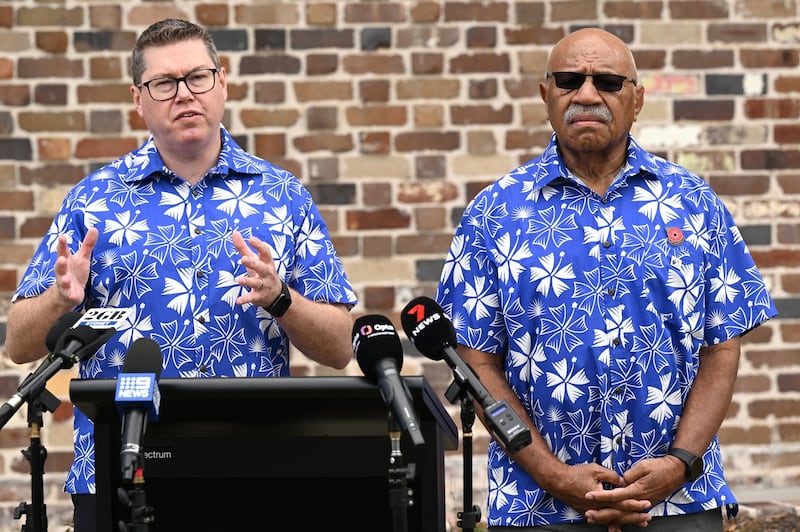Fiji’s prime minister and former coup leader has called for Pacific island nations to declare their ocean territories a “zone of peace” as the United States and China jostle for influence in the region.
In a speech to Australia’s Lowy Institute, Sitiveni Rabuka light-heartedly referred to himself as a “Rambo” figure because of his leadership of two coups in Fiji in the late 1980s and acknowledged some people might have questions about him becoming an “apostle of peace.”
The blunt-talking Rabuka said Pacific island countries are poor, aid-dependent and have carried little weight on the world stage, but control exclusive economic zones larger than North America and Europe combined, which gives them a right to be heard and recognized.
“History may be calling. It might be our manifest duty, destiny – to carry banners for peace and speak out for harmony in our time and forever,” he said in Canberra on Tuesday.
Rabuka is on an official visit to Australia and met with Australian Prime Minister Anthony Albanese on Wednesday, who said Australia would sell 14 Bushmaster armored vehicles to Fiji for the country’s use in U.N. peacekeeping missions.
On Thursday, the two countries agreed to cooperate on addressing cybersecurity threats and Fiji said it would become part of Australia’s e-visa pilot program.
Rabuka said he would push his peace zone idea at the 18-nation Pacific Islands Forum meeting next month in the Cook Islands and hoped member nations would back it.
Rabuka, however, has been at odds with the positions of some Pacific island leaders by backing Australia's plan to arm itself with nuclear-powered submarines and supporting what he called the science-based view that the release into the Pacific Ocean of treated wastewater from Japan's tsunami-damaged Fukushima nuclear plant is safe.
The peace zone could contribute, he said, to addressing the “complex West Papua question” – the conflict between Indonesia and its Papuan provinces, where an armed independence insurgency has continued for decades – or managing tribal conflicts in neighboring Papua New Guinea with the help of Fiji’s U.N. peacekeepers.
“These are just some of the initial thoughts. Extensive discussion and negotiations will be required with many stakeholders if the project for peace is to happen,” he said.

Rabuka became prime minister in December after opposition parties won a majority of votes in a national election, ending 16 years of rule by Frank Bainimarama – who first came to power in a 2006 coup – and his Fiji First Party.
Rabuka has apologized for his coups, which sought to reassert indigenous Fijian political and economic power but also unleashed violence against Indo-Fijians, who are the descendants of indentured Indian laborers brought to Fiji by the British in the late 19th century.
As part of Rabuka’s efforts to create a legacy that is broader than his coups, one of his government’s early moves was the abolition of a Bainimarama-era media law that chilled political debate and freedom of expression.
“Some of you know, I have repented, I am reborn. My past cannot be removed but I can compensate to some extent for what I have done,” he said. “Many years ago I became a convinced democrat.”
Fiji’s ties with China burgeoned after Australia, New Zealand and other nations attempted to punish the Pacific island country for its 2006 coup, aiding Beijing’s broader push for influence in the Pacific.
Relations have cooled under Rabuka who put a police cooperation agreement with China under review. In his Lowy speech, Rabuka said Fiji continued to value its relationship with the world's No. 2 economy even as its rivalry with the U.S. appeared to be intensifying.
Without naming any country, he said Fiji was grateful for the aid it received provided the country doesn’t become entrapped by it.
“Unfortunately some aid donors expect us to be compliant, to submit to their demands, so we have to be very, very careful,” he said.
BenarNews is an RFA-affiliated online news organization.
